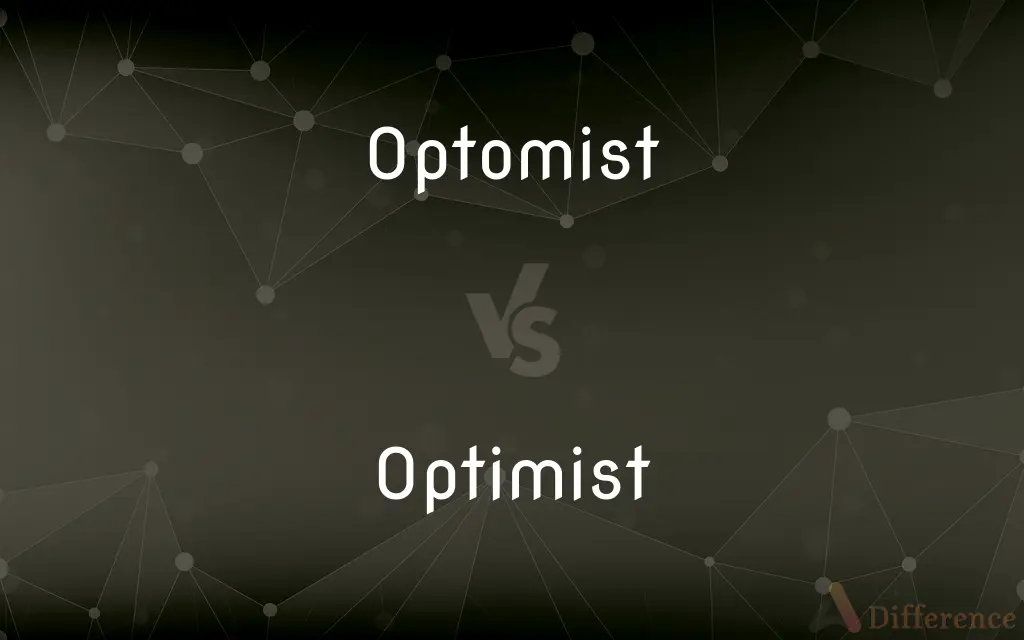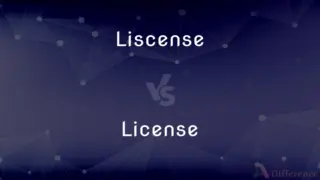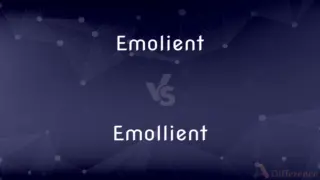Optomist vs. Optimist — Which is Correct Spelling?
Edited by Tayyaba Rehman — By Fiza Rafique — Updated on April 2, 2024
"Optomist" is an incorrect spelling. The correct spelling is "optimist," denoting someone hopeful and confident about the future.

Table of Contents
Which is correct: Optomist or Optimist
How to spell Optimist?

Optomist
Incorrect Spelling

Optimist
Correct Spelling
ADVERTISEMENT
Key Differences
Visualize an optimist as someone who sees the "optimal" side of things.
The root "opti-" is consistent across words like "optimal" and "optimum."
"Optimist" starts with "optim," similar to "optimism," the positive outlook they have.
Remember, there's no "o" after the "t" in "optimist."
Think of "optimal," which relates to the best or most favorable situation, like an optimist's mindset.
ADVERTISEMENT
How Do You Spell Optimist Correctly?
Incorrect: She is such an optomist, always looking at the bright side of things.
Correct: She is such an optimist, always looking at the bright side of things.
Incorrect: He's not an optomist; he always expects the worst.
Correct: He's not an optimist; he always expects the worst.
Incorrect: I wish I could be more of an optomist like you.
Correct: I wish I could be more of an optimist like you.
Incorrect: Being an optomist helps her overcome many challenges.
Correct: Being an optimist helps her overcome many challenges.
Optimist Definitions
A person who tends to be hopeful and sees the positive side of things.
Even during hard times, an optimist can find a silver lining.
An individual who expects a favorable result.
Being an optimist, he started the project with enthusiasm.
A person who sees good in situations or events.
While many were discouraged, the optimist in the room reminded them of past successes.
Someone confident about future outcomes.
As an optimist, she believed everything would work out.
Someone opposed to pessimism, focusing on positive outcomes.
The optimist often clashed with the pessimist during discussions.
One who usually expects a favorable outcome.
A believer in philosophical optimism.
A person who expects a favourable outcome
A believer in optimism
One who holds the opinion that all events are ordered for the best.
One who looks on the bright side of things, or takes hopeful views; one who experiences optimism{2}; - opposed to pessimist.
A person disposed to take a favorable view of things
Optimist Meaning in a Sentence
Being an optimist can lead to better health and happiness.
He's an optimist who believes that good things come to those who wait.
An optimist will see failure as an opportunity to learn.
She describes herself as a realist, but she's definitely more of an optimist.
The optimist in me believes we can still win this game.
As an optimist, he never gives up hope, even in tough times.
To an optimist, every obstacle is seen as a stepping stone.
I admire her; she's an optimist who sees the best in people.
She was an optimist who always encouraged her friends.
He approached the situation not just as an optimist but as a problem-solver.
Common Curiosities
Why is it called optimist?
It derives from the Latin word "optimum," meaning "best," reflecting a positive outlook.
What is the root word of optimist?
The root word is "optimus," meaning "best" in Latin.
What is the pronunciation of optimist?
It's pronounced as /ˈɒptɪmɪst/.
What is the verb form of optimist?
"Optimist" is a noun. A related verb is "optimize."
Which conjunction is used with optimist?
Any conjunction, like "and" or "but," can be used, depending on the sentence.
Which article is used with optimist?
The article "an" is typically used before "optimist."
Is optimist an abstract noun?
Yes, "optimist" is an abstract noun as it represents an idea or quality rather than a physical entity.
Which vowel is used before optimist?
The article "an" is used before "optimist."
What is the plural form of optimist?
The plural form is "optimists."
Which preposition is used with optimist?
Various prepositions can be used, such as "of" as in "optimist of the year."
Is the optimist term a metaphor?
No, "optimist" itself isn't a metaphor but can be used in metaphorical expressions.
What is the singular form of optimist?
"Optimist" is the singular form.
What part of speech is optimist?
"Optimist" is a noun.
Is optimist an adverb?
No, "optimist" is not an adverb.
Is optimist a countable noun?
Yes, "optimist" is a countable noun.
How many syllables are in optimist?
There are three syllables in "optimist."
What is a stressed syllable in optimist?
The stressed syllable is "op."
What is another term for optimist?
Another term for optimist is "positive thinker."
What is the third form of optimist?
Once more, "optimist" is a noun and doesn't have verb forms.
Is optimist a vowel or consonant?
"Optimist" is a word containing both vowels and consonants.
How do we divide optimist into syllables?
It can be divided as op-ti-mist.
What is the opposite of optimist?
The opposite of "optimist" is "pessimist."
Which determiner is used with optimist?
Determiners like "this," "that," "an," or "some" can be used with "optimist."
What is the first form of optimist?
"Optimist" is a noun and doesn't have verb forms.
What is the second form of optimist?
Again, "optimist" is a noun and doesn't have verb forms.
Is optimist a noun or adjective?
"Optimist" is a noun.
Is optimist a negative or positive word?
"Optimist" has a positive connotation.
Is optimist a collective noun?
No, "optimist" is not a collective noun.
Is the word optimist imperative?
No, "optimist" is not in the imperative mood.
Share Your Discovery

Previous Comparison
Liscense vs. License
Next Comparison
Emolient vs. EmollientAuthor Spotlight
Written by
Fiza RafiqueFiza Rafique is a skilled content writer at AskDifference.com, where she meticulously refines and enhances written pieces. Drawing from her vast editorial expertise, Fiza ensures clarity, accuracy, and precision in every article. Passionate about language, she continually seeks to elevate the quality of content for readers worldwide.
Edited by
Tayyaba RehmanTayyaba Rehman is a distinguished writer, currently serving as a primary contributor to askdifference.com. As a researcher in semantics and etymology, Tayyaba's passion for the complexity of languages and their distinctions has found a perfect home on the platform. Tayyaba delves into the intricacies of language, distinguishing between commonly confused words and phrases, thereby providing clarity for readers worldwide.







































